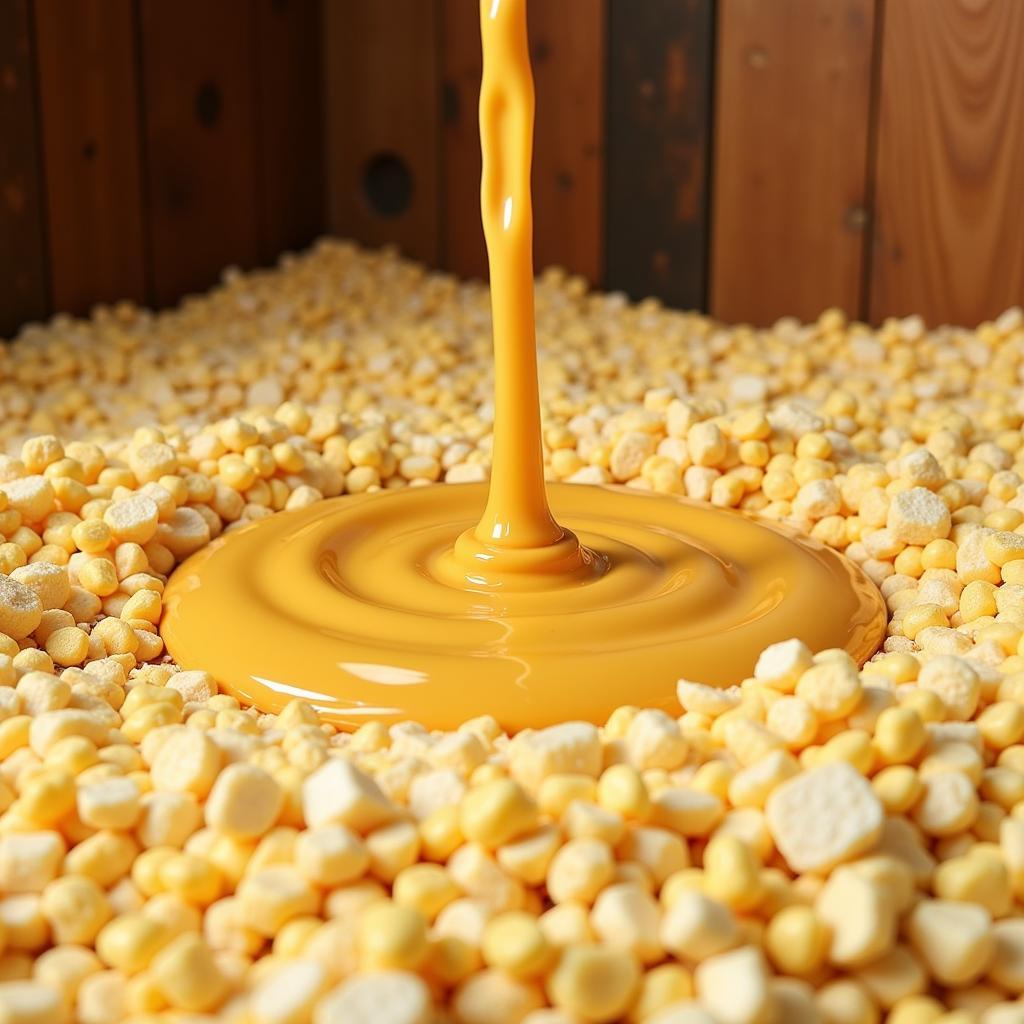Corn Cob Bedding For Horses is a popular choice amongst horse owners due to its absorbency, affordability, and dust-free nature. But is it the right choice for your horse? This comprehensive guide will explore the pros and cons of corn cob bedding, helping you decide if it’s the perfect fit for your equine companion.
Exploring the Benefits of Corn Cob Bedding
Corn cob bedding offers several advantages that make it a compelling option for horse owners. It’s highly absorbent, soaking up urine and moisture effectively, keeping your horse’s stall drier for longer. This absorbency translates to less frequent stall cleaning, saving you time and effort. Corn cob bedding is also known for its dust-free qualities, which is particularly beneficial for horses with respiratory sensitivities. Furthermore, it’s typically more affordable than other bedding options like shavings or pellets, making it a budget-friendly choice. Finally, many horses find corn cob bedding comfortable to lie on.
 Corn Cob Bedding Absorbing Liquid
Corn Cob Bedding Absorbing Liquid
Another benefit of corn cob bedding is its biodegradability. Unlike some synthetic bedding materials, corn cob bedding can be composted easily, making it an environmentally friendly choice. This makes disposal simple and contributes to a sustainable approach to horse care. Furthermore, corn cob bedding is readily available in most areas, making it a convenient option for horse owners.
Addressing the Potential Downsides of Corn Cob Bedding
While corn cob bedding offers many advantages, it’s important to consider the potential downsides. Some horses may be tempted to eat corn cob bedding, which can lead to colic or other digestive issues. If your horse is prone to eating its bedding, corn cob might not be the best choice. Additionally, while corn cob bedding is generally dust-free, the process of breaking down the cobs can create a fine powder that some horses may find irritating.
Another concern is the potential for mold growth if the bedding isn’t properly managed. Regular stall cleaning and proper ventilation are essential to prevent mold growth and ensure a healthy environment for your horse. Finally, while corn cob bedding is generally affordable, the price can fluctuate depending on availability and location.
Is Corn Cob Bedding Right for Your Horse?
Determining if corn cob bedding is right for your horse depends on several factors. Consider your horse’s individual needs and preferences. If your horse has respiratory issues, the dust-free nature of corn cob bedding can be a significant advantage. If your horse is prone to eating its bedding, you might want to consider alternatives.
Your budget and management practices also play a role. If you’re looking for an affordable and biodegradable bedding option, corn cob is a good choice. However, if you’re not able to maintain a consistent stall cleaning schedule, you might want to opt for a bedding type that’s less susceptible to mold growth.
Conclusion: Making an Informed Decision about Corn Cob Bedding
Corn cob bedding for horses offers a combination of absorbency, affordability, and dust-free qualities. While it has potential drawbacks, proper management and consideration of your horse’s individual needs can help you determine if corn cob bedding is the right choice for your equine companion. Choosing the right bedding contributes significantly to your horse’s health and comfort, so make an informed decision based on the information provided in this comprehensive guide.
FAQ:
- How often should I clean a stall with corn cob bedding?
- Can corn cob bedding be composted?
- Is corn cob bedding safe for horses with allergies?
- How much corn cob bedding do I need for a standard stall?
- What are the alternatives to corn cob bedding?
- How can I prevent my horse from eating corn cob bedding?
- Where can I purchase corn cob bedding?
Please contact us at Phone Number: 0772127271, Email: [email protected] Or visit us at: QGM2+WX2, Vị Trung, Vị Thuỷ, Hậu Giang, Việt Nam. We have a 24/7 customer service team.